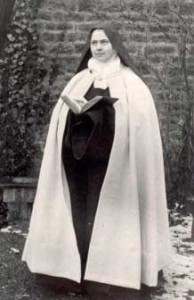Podcast: Play in new window | Download (Duration: 29:23 — 20.3MB) | Embed
Subscribe: Apple Podcasts | Spotify | Amazon Music | Android | Pandora | iHeartRadio | JioSaavn | Podchaser | Gaana | Podcast Index | Email | TuneIn | Deezer | Anghami | RSS | More

Episode 20 – “Heaven in Faith” Day 10 Prayer 2 – “A praise of glory is a soul that lives in God”
Dr. Anthony Lilles and Kris McGregor explore St. Elizabeth of the Trinity’s concept of becoming a “praise of glory” for the Holy Trinity; surrendering completely to God’s will, allowing the Holy Spirit to transform one’s soul into a reflection of God’s love and glory. This transformation involves living in pure love, silence, and faith, gazing upon God and allowing Him to radiate through oneself.
True prayer is not about achieving mental states or experiences but about surrendering to Christ and allowing His life to animate one’s own; asking for intercession to deepen one’s prayer life and encounter with God and cultivating a deep, intimate relationship with Christ, allowing Him to lead one to the depths of prayer and spiritual growth.

From “Heaven in Faith: Day 10 Prayer 2”:
“We have been predestined by the decree of Him who works all things according to the counsel of His will, so that we may be the praise of His glory.”
It is St. Paul who tells us this, St. Paul who was instructed by God Himself. How do we realize this great dream of the Heart of our God, this immutable will for our souls? In a word, how do we correspond to our vocation and become perfect Praises of Glory of the Most Holy Trinity?
“In Heaven” each soul is a praise of glory of the Father, the Word, and the Holy Spirit, for each soul is established in pure love and “lives no longer its own life, but the life of God.” Then it knows Him, St. Paul says, as it is known by Him. In other words “its intellect is the intellect of God, its will the will of God, its love the very love of God. In reality it is the Spirit of love and of strength who transforms the soul, for to Him it has been given to supply what is lacking to the soul,” as St. Paul says again. “He works in it this glorious transformation.” St. John of the Cross affirms that “the soul surrendered to love, through the strength of the Holy Spirit, is not far from being raised to the degree of which we have just spoken,”180 even here below! This is what I call a perfect praise of glory!
A praise of glory is a soul that lives in God, that loves Him with a pure and disinterested love, without seeking itself in the sweetness of this love; that loves Him beyond all His gifts and even though it would not have received anything from Him, it desires the good of the Object thus loved. Now how do we effectively desire and will good to God if not in accomplishing His will since this will orders everything for His greater glory? Thus the soul must surrender itself to this will completely, passionately, so as to will nothing else but what God wills.
A praise of glory is a soul of silence that remains like a lyre under the mysterious touch of the Holy Spirit so that He may draw from it divine harmonies; it knows that suffering is a string that produces still more beautiful sounds; so it loves to see this string on its instrument that it may more delightfully move the Heart of its God.
A praise of glory is a soul that gazes on God in faith and simplicity; it is a reflector of all that He is; it is like a bottomless abyss into which He can flow and expand; it is also like a crystal through which He can radiate and contemplate all His perfections and His own splendor. A soul which thus permits the divine Being to satisfy in itself His need to communicate “all that He is and all that He has,” is in reality the praise of glory of all His gifts.
Finally, a praise of glory is one who is always giving thanks. Each of her acts, her movements, her thoughts, her aspirations, at the same time that they are rooting her more deeply in love, are like an echo of the eternal Sanctus.
In the Heaven of glory the blessed have no rest “day or night, saying: Holy, holy, holy is the Lord God Almighty. . . . They fall down and worship Him who lives forever and ever. . . .”
In the heaven of her soul, the praise of glory has already begun her work of eternity. Her song is uninterrupted, for she is under the action of the Holy Spirit who effects everything in her; and although she is not always aware of it, for the weakness of nature does not allow her to be established in God without distractions, she always sings, she always adores, for she has, so to speak, wholly passed into praise and love in her passion for the glory of her God. In the heaven of our soul let us be praises of glory of the Holy Trinity, praises of love of our Immaculate Mother. One day the veil will fall, we will be introduced into the eternal courts, and there we will sing in the bosom of infinite Love. And God will give us “the new name promised to the Victor.” What will it be?
Elizabeth of the Trinity. The Complete Works of Elizabeth of the Trinity, vol. 1 (featuring a General Introduction and Major Spiritual Writings) (Elizabeth of the Trinity Complete Work) (pp. 165-167). ICS Publications. Kindle Edition.
Discerning Hearts Reflection Questions
- Embracing the Concept of “Praise of Glory”: How do you understand the concept of being a “praise of glory” for the Holy Trinity, as described by Blessed Elizabeth of the Trinity?
- Surrendering to God’s Will: Reflect on the idea of surrendering completely to God’s will. How does this concept challenge or resonate with your own spiritual journey?
- Living in Pure Love and Silence: How can we cultivate a life of pure love and silence, allowing the Holy Spirit to transform our souls? What practical steps can we take to foster this transformation in our daily lives?
- Gazing Upon God in Faith: Elizabeth speaks of gazing upon God in faith and simplicity. How do you currently practice this in your prayer life? What obstacles do you encounter in maintaining this gaze?
- Relationship with Christ: Reflect on the importance of having a personal relationship with Christ in deepening your prayer life. How can you strengthen this relationship in your daily activities and spiritual practices?
- Asking for Intercession: Do you believe in the power of asking for intercession from saints like Blessed Elizabeth of the Trinity? How might you incorporate asking for her help in deepening your prayer life?
- True Prayer vs. Mental States: Consider the distinction made between true prayer, focused on surrendering to Christ, and the pursuit of mental states or experiences. How can you ensure that your prayer life remains centered on Christ rather than on personal experiences or achievements?
- Cultivating Intimacy with Christ: What steps can you take to cultivate a deeper, more intimate relationship with Christ, allowing Him to lead you to the depths of prayer and spiritual growth?
We would like to thank Miriam Gutierrez for providing “the voice” of St. Elizabeth for this series
For other episodes in the series visit the Discerning Hearts page for Dr. Anthony Lilles
Anthony Lilles, S.T.D., has served the Church and assisted in the formation of clergy and seminarians since 1994. Before coming to St. Patrick’s, he served at seminaries and houses of formation in the Archdiocese of Denver and the Archdiocese of Los Angeles. The son of a California farmer, married with young adult children, holds a B.A. in theology from the Franciscan University of Steubenville with both the ecclesiastical licentiate and doctorate in spiritual theology from the Pontifical University of Saint Thomas Aquinas in Rome (the Angelicum). An expert in the writings of St. Elizabeth of the Trinity and the Carmelite Doctors of the Church, he co-founded the Avila Institute for Spiritual Formation and the High Calling Program for priestly vocations. He also founded the John Paul II Center for Contemplative Culture, which hosts symposiums, retreats, and conferences. In addition to his publications, he blogs at www.beginningtopray.com .





